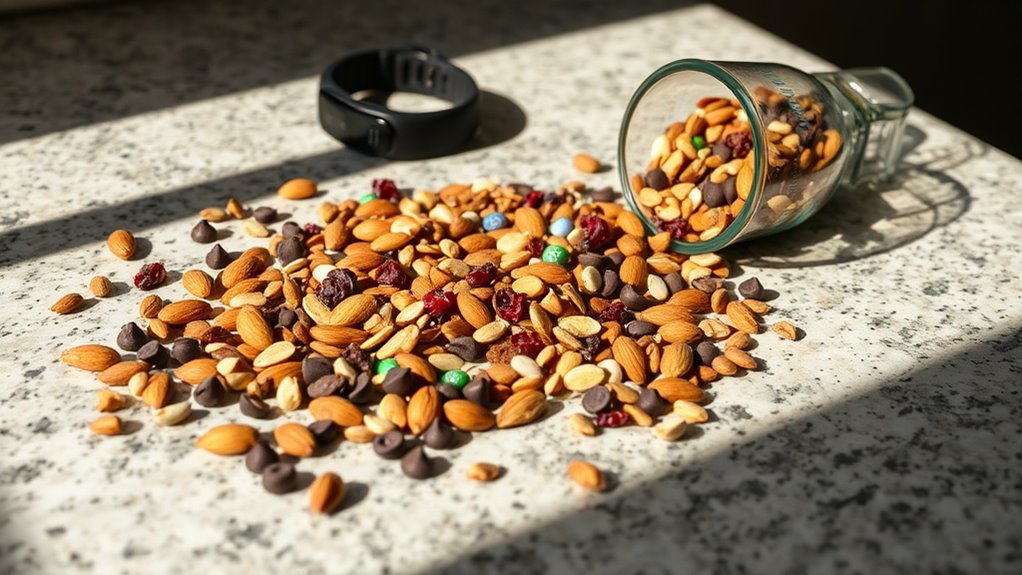The Most Overlooked Reason Your Diet Isn’t Working
You’ve tried every diet trick, but it’s still not clicking. Hidden calories from sugary drinks and snacks often slip past your radar, throwing off your hunger hormones and fueling emotional eating. If you’re ready to uncover how simple tweaks can turn things around, stick with me.
The Hidden Impact of Stress on Your Eating Habits
When stress builds, it can secretly derail your diet by triggering hormonal changes that boost your cravings for unhealthy foods.
This overlooked weight loss mistake often sneaks up on you, as cortisol spikes lead to emotional eating and poor choices, backed by research showing stress alters appetite regulation.
You’re not alone; many overlook how daily pressures sabotage progress.
Combat this by incorporating stress-busting routines like quick walks or deep breathing exercises—they help reset your hormones and curb impulses.
Excess belly fat can also trigger cortisol production which further complicates your weight loss efforts.
Stay vigilant; addressing this hidden factor empowers you to reclaim control and achieve lasting results.
Why Inadequate Sleep Derails Weight Loss Efforts
You mightn’t realize that skimping on sleep throws your hormones out of balance, increasing hunger signals and reducing satiety ones.
This hormonal chaos makes you crave more food, undermining your diet efforts.
Plus, chronic sleep loss slows your metabolism, so you’re burning fewer calories throughout the day. Adequate rest is essential for balancing hormones that regulate hunger and appetite.
Sleep and Hormones
Inadequate sleep disrupts key hormones like cortisol, ghrelin, and leptin, undermining your weight loss efforts before you even step on the scale.
Elevated cortisol heightens stress, driving fat storage and emotional eating. Ghrelin surges, amplifying hunger and cravings for high-calorie foods, while falling leptin signals your body to ignore fullness cues, leading to overconsumption.
Research from sleep studies confirms this hormonal imbalance reduces dietary adherence.
Prioritize 7-9 hours of restful sleep nightly to stabilize these hormones, curb appetite, and boost your resolve—practical steps that directly enhance weight loss outcomes.
Metabolism From Sleep Loss
Sleep deprivation doesn’t just disrupt hormones; it actively slows your metabolism, turning your body into an inefficient calorie-burning machine and sabotaging weight loss goals.
Studies show that less than seven hours of sleep nightly reduces resting metabolic rate, as your body conserves energy and craves high-calorie foods. This leads to increased insulin resistance, making fat storage easier and weight loss harder.
To counteract this, prioritize seven to nine hours of quality sleep nightly—it’s a practical step backed by research to boost your metabolic efficiency and enhance diet success.
Overlooked Sources of Hidden Calories in Daily Life
You’ve probably overlooked the calories lurking in your daily drinks, like sugary sodas or creamy coffees, which can sabotage your weight loss without you even noticing.
Sneaky snack sources, such as office treats or mindless munching, add hidden calories that accumulate fast.
Addressing these effectively lets you make smarter choices and enhance your diet’s success. For instance, many commercial smoothies often include added sugars that can turn a supposedly healthy drink into a calorie bomb.
Hidden Drink Calories
When you’re trying to lose weight, the calories in your drinks often slip under the radar, yet they can sabotage your efforts just as much as solid foods.
Research shows beverages contribute up to 20% of daily calories, often unnoticed. To spot these hidden pitfalls, focus on:
-
Sugary sodas: A 12-ounce can delivers 140 calories from high-fructose corn syrup, offering no nutritional value and spiking blood sugar.
-
Fruit juices: Even “natural” options pack 120 calories per cup, lacking fiber to signal fullness, leading to overconsumption.
-
Specialty coffees: Your favorite mocha might add 300 calories from syrups and cream, turning a quick pick-me-up into a calorie bomb.
-
Energy drinks: They boast 200+ calories per serving with caffeine and sugars that don’t sustain energy, promoting crashes and more intake.
Cut these to reclaim control and enhance results.
Sneaky Snack Sources
Beyond obvious meals, sneaky snack sources often pack hidden calories that derail your diet without you realizing it. Common culprits include office treats, vending machine grabs, and seemingly healthy items like flavored yogurt or granola bars, which studies from the Journal of the Academy of Nutrition and Dietetics show can add 200-500 calories daily.
You’re unwittingly consuming excess sugar and fats from these sources. Combat this by scanning labels for hidden ingredients, portioning snacks mindfully, and replacing them with whole foods like apple slices or carrots.
Track intake via apps to spot patterns and cut unnecessary calories effectively.
How Social Environments Undermine Your Diet Goals
Social environments can subtly sabotage your diet efforts, as peer pressure and everyday gatherings often push you toward unhealthy choices like oversized portions or sugary treats.
Evidence from behavioral studies shows that social influences can boost your calorie intake by 30-50%, making it harder to resist temptations. To maintain control, identify these common pitfalls:
-
At a family dinner, relatives insist you finish the heaping plate of fried favorites, evoking guilt if you refuse.
-
During office parties, colleagues pass around platters of decadent desserts, turning celebrations into calorie traps.
-
In group outings, friends order shared appetizers like cheesy nachos, normalizing overindulgence.
-
At social events, hosts promote toasting with sugary drinks, blending fun with unintended excess. Mindful snacking can help mitigate these situations by encouraging healthier choices even in social settings.
The Role of Inconsistent Meal Patterns in Diet Failure
Inconsistent meal patterns often sabotage your diet by throwing off your body’s natural rhythms and metabolism.
Studies confirm that irregular eating disrupts hunger hormones like ghrelin and leptin, causing energy crashes and overeating. You spike insulin levels when skipping meals, fostering fat storage and reduced calorie burn.
To counter this, establish a consistent schedule—aim for three balanced meals plus snacks at regular intervals. Track your patterns in a journal; this practical step stabilizes blood sugar and enhances adherence, as evidenced by clinical trials showing better weight loss in routine eaters. Additionally, cultivating a positive mindset can further support your dietary efforts and overall weight management.
Stay disciplined to succeed.
Unrecognized Nutrient Deficiencies Sabotaging Progress
Even though you might be following your diet plan diligently, unrecognized nutrient deficiencies could be quietly sabotaging your progress by hindering metabolism and energy levels.
Research shows these gaps often stem from imbalanced diets, leading to fatigue and stalled weight loss. To spot and fix them, consider these common issues:
-
Iron deficiency leaves you exhausted mid-workout, as your body struggles to transport oxygen efficiently.
-
Vitamin D shortfall slows fat metabolism, making calories linger like unburned fuel.
-
Magnesium lack triggers muscle cramps, visualizing your body as a machine seizing up under stress.
-
B vitamin gaps dim your energy like a fading battery, disrupting daily activity and focus. Additionally, ensuring adequate hydration can further enhance your metabolism and support overall energy levels.





